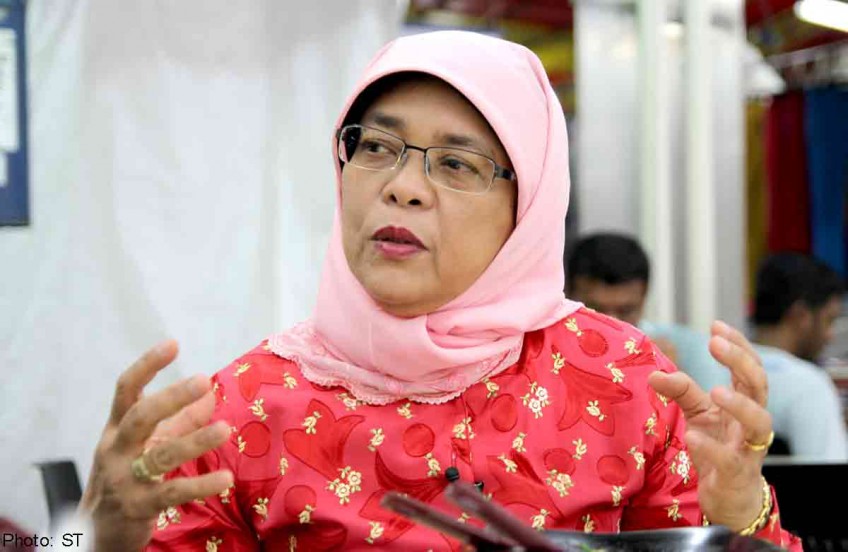Halimah Yacob: We should not be so condescending in our mindsets and attitudes

Question: Why did the PAP set up the PAP Seniors' Group which you are chairing, and what are your key priorities for this group?
Halimah Yacob (HY): Because of the rapidly ageing population, the number of people who are sick, the number of elderly people have increased tremendously. So the party wanted to have greater focus on their needs and how to serve them - very much like what we have done for the women as well as the young.
The objective of PAP.SG is essentially to raise issues, or to up-shape policies and programmes on cross-cutting issues affecting our seniors on matters like their quality of life, manner of their care as well as their security.
We also want to look at ways of encouraging greater volunteerism, both among our healthy seniors as well as the young people to support our seniors.
We need to look at also the innovative practices in order to reach out to our seniors and support them.
Q: We've been hearing talk of Singapore's rapidly ageing population for some years now. How ready, really, is Singapore?
HY: Quite a number of reports have already been produced, committee set up and recommendations made. In fact, in the infrastructure over the last two years, the government have announced to build more nursing homes and senior care centres, senior activity centres.. you know, these are being rolled out.
What I see as a big challenge for us is not so much in the infrastructure, but more in terms of the software, getting people - qualified people, professionals. For instance, we have enough physiotherapists, occupational therapists, speech therapists and so on that is needed, in order to support all these various activities, to support the frail elderly. That is one challenge - manpower.
The second challenge I think will also be in the area of the caregivers. Caregivers are also themselves growing old, you know, they also need support.
Q: In a recent letter to The Straits Times forum page, you called for a different mindset which is non-ageist, and which challenges some of the assumptions which people may have about the elderly. Can you tell us more about that?
HY: There is still very much an ageist society. Sometimes, people might not even know they are being ageist.
I received many feedback from job applicants - elderly job applicants, and they say it is very difficult for them to get a job because sometimes when they call up the employer and they ask for the age, immediately when they inform the employer of their ages, the employer says the vacancy, the job has been filled.
They immediately come to the assumption that they will not be productive, they will not be adaptable and they cannot perform their jobs. Do we give them an opportunity? It's our mindset that determines whether we want to give the person an opportunity or not, regardless of the person's age.
We must give them options to let them think for themselves what they want to do with their lives, and not always come to the conclusion that just because someone who is older and who is working, therefore that person is forced to work. These are choices sometimes we must trust that they want to make for themselves too. We should not be so condescending in our mindsets and our attitudes.
Q: You previously called for the legislation for eldercare leave. Why is that important?
HY: My reasoning is that the government wants ageing in place to take place, that is to take place at home and in the community.
But for the ageing to take place at home and in the community, the caregiver must have sufficient support. So I do get feedback from workers who are taking care of the elderly parents... that is it very difficult for them to take leave and sometimes the leave is just not enough.
For family care leave, it can be made flexible. If you have childcare obligations or responsibilities, then you can use the Family Care Leave for your childcare needs.
But if you have frail elderly parents and you need to bring your parents to see the doctors regularly or to do other things, you can use the Family Care Leave then. It's flexible, you see. It's already done in the civil service and some companies are already doing it. So, gradually, this - in my view, over time, must become a basic need.
Q: Take this issue that involves caregivers and eldercare. How would the PAP Seniors Group (PAP.SG) come into the picture?
HY: Apart from helping to shape policies and programmes, obviously what we want to do is also to see how we could develop a support network in all the different constituencies, in order to provide support to our elderly and seniors. Maybe can set up a chapter all over the constituencies to help connect our seniors to the services that are available for the community.
Q: It has been almost a year since you were elected Speaker of Parliament. How has it been so far?
HY: It has been a very exciting one year and also a very fast-paced one year, you know... because immediately after I became Speaker, we had the population debate in February and followed by the Committee of Supply.
This year, 2013, we also see a lot more questions being filed by MPs (Members of Parliament). In fact, on average, we have about 100 PQs (Parliamentary Questions), compared to 40 or 50 in the past, so it is a very active parliament and you also see more adjournment motions. In the past, it was very rare. You probably had one adjournment motion a year. Well, I think these are positive developments.
This article was transcribed from a Razor TV video.
 |
| Go to www.razor.tv for more videos |